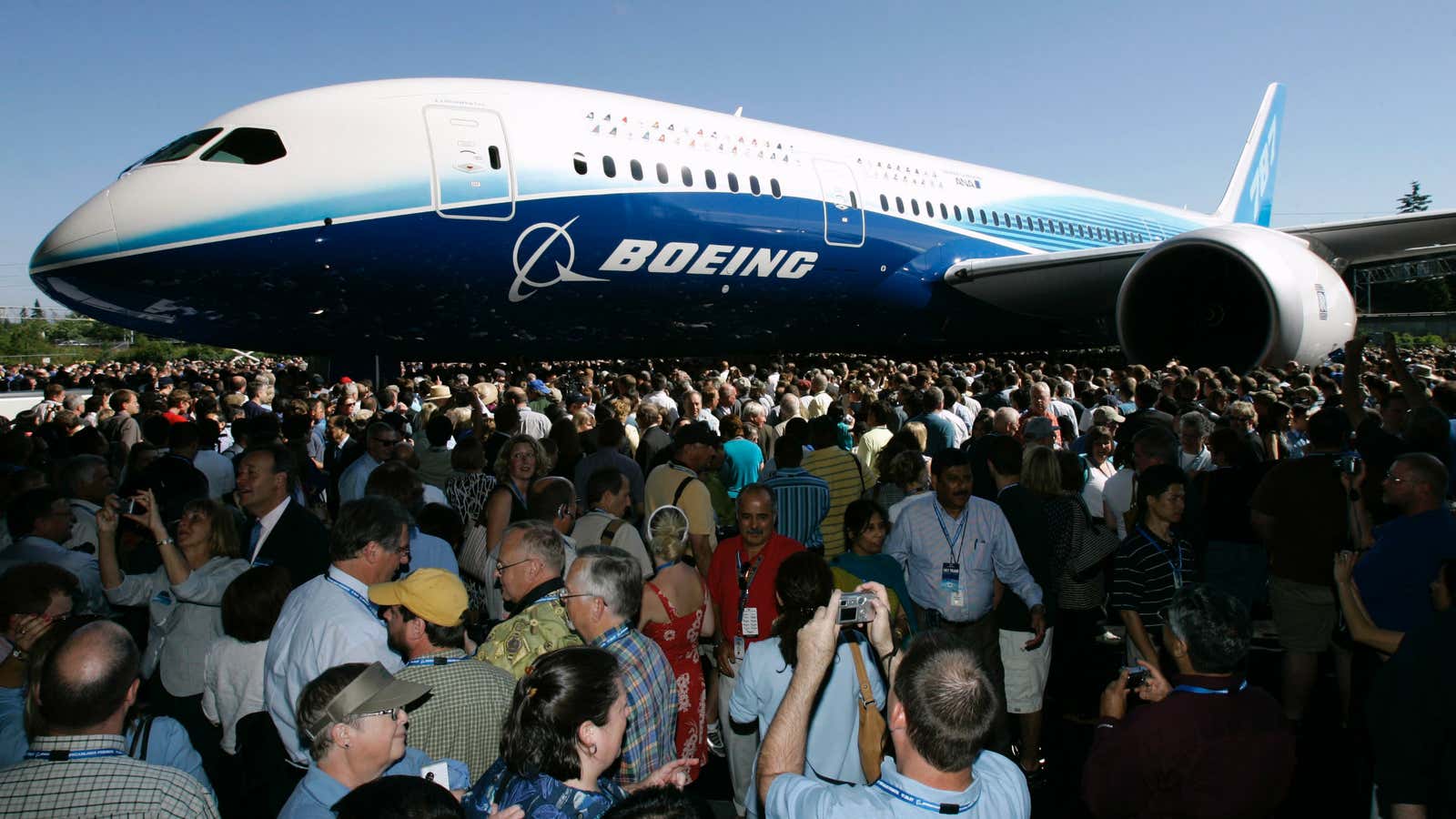Boeing CEO Jim McNerney swatted away doubting questions about the 787 from Wall Street analysts and reporters today, but his confidence did not settle nagging uncertainties about the impact of the aircraft’s troubles on company finances.
It was Boeing’s scheduled webcast to discuss fourth-quarter and annual earnings. The Chicago-based company beat Wall Street estimates, and its share price closed higher by 1.25%, its first tick up after a week-long slide. But that still left Boeing’s stock down 4% since fire and smoke aboard two Dreamliners led to the grounding of the entire fleet earlier this month. The incidents are under investigation in both the US and Japan, with most attention focused on the aircraft’s lithium-ion batteries.
The 63-year-old McNerney fielded questions from eight analysts and six reporters. All but one of the analysts and all the reporters asked about the Dreamliner; earnings were barely discussed. In terms of relevance to the Dreamliner questions, CFO Greg Smith said the company assumes “no significant financial impact” resulting from the fire trouble.
McNerney emphasized repeatedly that because of the probes, he is constrained in what he can say publicly. But, he said, “We will get to the bottom of this and in so doing, we will restore confidence in the 787 and Boeing.”
One presumes that McNerney is right on one matter: Between investigations by US and Japanese authorities, plus Boeing’s internal probe, we will discover why the aircraft suffered smoke and fire damage, and probably how to prevent it from happening again.
But the jury is out on a couple of other questions. One is Boeing’s reputation. It turns out that the 787’s battery uses lithium-cobalt-oxide chemistry, the most flammable of all the standard lithium-ion configurations. In a phone conversation I had today, a battery expert wondered aloud why Boeing doesn’t simply shift to lithium-titanium oxide, a heavier and slightly less powerful chemistry—but one that is far less prone to fire. When he is freer to discuss the aircraft, and when he is at the stage of persuading the public that they are perfectly safe, McNerney should explain why Boeing went with the higher-risk lithium-cobalt oxide.
The other element lacking clarity is how the trouble can fail to impact Boeing’s bottom line. The rollout of the company’s flagship aircraft appears likely to be delayed many months, which means, at minimum, a postponement of expected revenue and, possibly, canceled orders. There is the unknown cost of fixing the 50 jets currently in the working fleet, plus the dozen or more that will be sitting in warehouses by the time authorities approve them for flight. And there will presumably be a campaign to assure the public that the planes are safe.
All of that assumes that the 787 will fly again with a relatively inexpensive fix. One reporter asked McNerney whether Boeing is considering simply swapping out of lithium-ion batteries entirely in order to get past the crisis. If it does, that will be another cost.
“Nothing we’ve learned has told us that we’ve—yet—has told us that we have made the wrong choice on the battery technology. We feel good about the battery technology and its fit for the airplane,” McNerney said. “We’ve just got to get to the root cause of these incidents, and we’ll take a look at the data as it unfolds.”
Glitches with consumer products are not new. Neither are recalls. The record is that the public gets over them, especially once trusted regulators issue an assurance that the coast is clear. And at this point, one ought to presume that McNerney is right that the 787 will soon be cleared for takeoff with no material financial damage to Boeing.
Yet consumers appear to have less patience for such glitches than they once did. And if there is a shred of danger of another battery going up in flames, there is very little chance that regulators will give the green light. Therefore the situation is not really as normal as McNerney likes to project.
